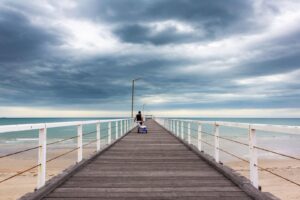Courts have the power in many cases to make wills on behalf of people who lack the legal capacity to do so for example by reason of dementia.
The Supreme Court of South Australia was recently asked by the Public Trustee of that State for orders approving and authorising the making of a will for Ross Snoswell, aged 88.
 Ross was born in 1935 and lived his entire life in his parents’ home in Largs Bay, to the north-west of Adelaide on St Vincents Gulf, until he suffered a fall in 2018.
Ross was born in 1935 and lived his entire life in his parents’ home in Largs Bay, to the north-west of Adelaide on St Vincents Gulf, until he suffered a fall in 2018.
Ross had never married and had no children, but after the fall he could not return home alone. He took up residence with his long-term partner Margaret Gallary, having known her since his 20’s when they met at the Wonderland Dance Hall in Adelaide.
Margaret also had no children but her nephew Wayne, niece Selena and Selena’s husband Scott provided support to she and Ross over the years.
After Ross’s father died in 1971, his mother Heloise transferred their Largs Bay home into her and Ross’s name as joint tenants, in consideration of “love and affection” without any payment from Ross.
When Heloise died in 1988 Ross became sole owner of Largs Bay property, denying his only sibling Rhonda any beneficial interest in it.
Rhonda considered legal action to gain a share the property but decided against it, not wanting to force Ross from the family home. Rhonda herself died in 2020 and was survived by her husband, Kingsley, and their children, Pamela Crouch and David Cammiss.
Unbeknown to all, Ross had significant assets in excess of $1M including at least one other residential investment property, in addition to Largs Bay.
Following his 2018 fall, Ross was diagnosed with vascular dementia and the Public Trustee of South Australia was appointed as his administrator. In 2021, Margaret and Selena were appointed limited guardians for healthcare and in home support services.
As Ross had no will, his beneficiaries under intestacy rules would either be Margaret – if she qualified as Ross’s spouse – or his niece Pamela and nephew David in equal shares if Margaret did not so qualify.
The Public Trustee considered that given the significant size of his estate and his multi-faceted family history, it should apply to the Court for authorisation to make Ross’s will.
They filed proceedings in which Ross was named as respondent and was represented by a solicitor Mark Jordan as his litigation guardian. Margaret, Pamela and David were also parties to the proceedings.
The Court cannot make a will for someone if they have the capacity to do so themselves. Her honour, Justice Anne Bampton, agreed with the position taken by all parties that Ross lacked capacity to make a will and was unlikely to regain it.
The court thus had the requisite power to make Ross’s will, but her honour had to consider whether any proposed will accurately reflected his likely intentions if he were in the position of having the legal capacity that he lacked.
Ross had never made any wills, but his litigation guardian Jordan swore of several discussions when Ross had expressed his desires regarding his estate.
It was clear Ross wanted to gift the Largs Bay property to Margaret, and $30,000 to his neighbour Rod Hunter.
Ross had also indicated to Jordan that he did not want Pamela and David to get anything from his estate but that Selena, Scott and Wayne should receive a benefit in recognition of the support and assistance they had provided to him and Margaret.
Because of some inconsistences in the evidence and differing accounts as to his relationship with Pamela and David, her honour concluded his feelings towards them “may have softened or mellowed over time if he had not lost testamentary capacity and was not open to influence from others”.
The Public Trustee proposed a will in which Margaret was the executor, $30k was left to Rod, $50,000 to each of Pamela and Rod, the Largs Bay property for Margaret, and then 50% of the residue to Margaret, 25% to Wayne, and 25% to Selena and Scott.
The guardian Jordan proposed a will in which the estate went 50% to Margaret, and the remaining 50% to Selena, Wayne, and charity. A third version – put up by Pamela and David – had Pamela and David receiving the Largs Bay property, and the residue distributed as per the will proposed by the Public Trustee.
Justice Bampton determined that Ross clearly wanted to benefit Margaret and Rod as well as Selena, Scott and Wayne who had provided support, he would likely have considered gifts to Pamela and David “equal to approximately half the value of the Largs Bay property” if he had capacity, was aware he had “ample assets” and was uninfluenced by others.
Accordingly her honour authorised a will be made appointing the Public Trustee as executor and giving Largs Bay to Margaret. Then after the $30,000 gift to neighbour Rod, the residue was to be divided by way of 50% to Margaret, $250,000 to each of Pamela and David, and then 50% of the balance to Selena and Scott and the other 50% to Wayne.
Other states including Queensland have similar legislative provisions for wills to be made by the court when a person is unable to do for so themselves.
In the Estate of Snoswell [2023] SASC 35 Bampton J, 10 March 2023